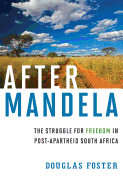
For many Americans, the most they know about South Africa is the story of Nelson Mandela. Although his contributions changed that nation forever, Mandela has retired from public life, and other leaders, including his successor Thabo Mbeki and current president Jacob Zuma, have taken his place. After Mandela is Douglas Foster's highly readable examination of the changes and struggles faced by South Africa in the post-Apartheid era.
Foster summarizes the history of South Africa, emphasizing its complicated origins and makeup, then raises questions about the myriad issues facing the country now. During a six-year period of extended research trips, he interviewed hundreds of South Africans, from politicians and wealthy businessmen to street orphans and HIV-positive teenagers. Their voices express both deep struggle and fierce hope.
Though South African politics struggles with deep racial and socioeconomic division, Foster presents a balanced view of the major parties and leaders. He praises positive developments, such as the distribution of antiretroviral medication for AIDS patients, but no politician--not even Mandela himself--is guiltless. As Foster struggles to fully explain the tangled web of political relations, it's clear that the fledgling democracy must still contend with backstabbing, corruption and favoritism.
From vibrant, cosmopolitan cities such as Cape Town and Johannesburg to rural "homelands" still governed by ancient traditions, Foster ably evokes the multilayered, multicultural voices of South African society. --Katie Noah Gibson, blogger at Cakes, Tea and Dreams

